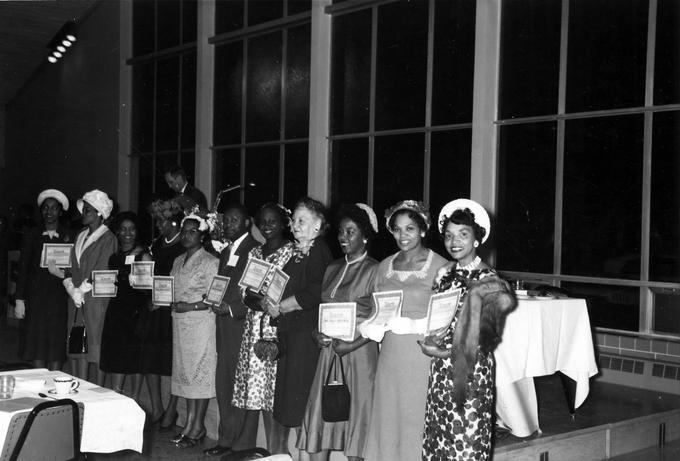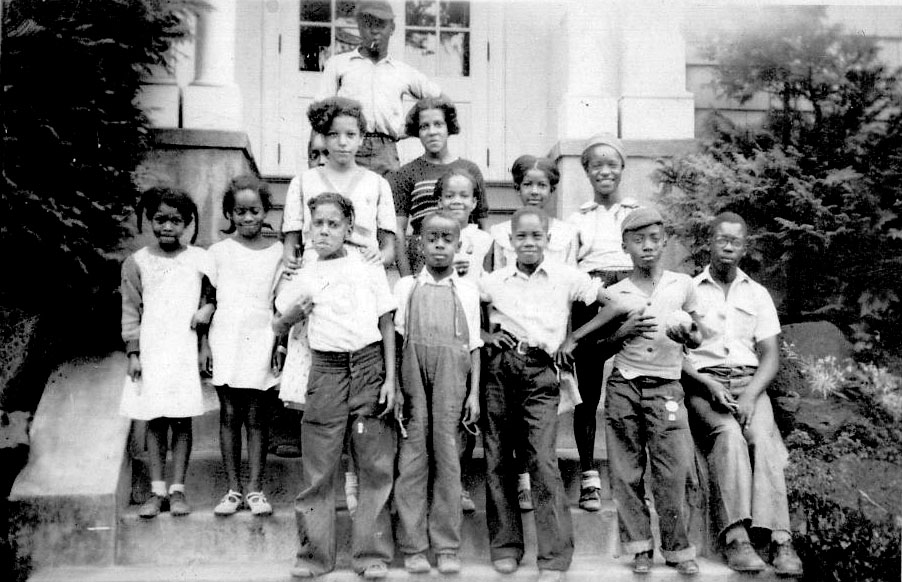In addition to the community organizing that characterized so many of her contemporaries, Willie Mae Young Hart made a habit of breaking the color line. She helped operate Portland's first Black-owned cab company and was the first African American nurse to work at Portland's Physicians and Surgeons Hospital.
As a founding member of the Portland Chapter of the National Council of Negro Women (NCNW) and Women In Community Service (WICS), Hart inspired others to serve as agents of change. At age ninety-four in 2010, she continued her engagement with community and social justice through her active involvement in Church Women United and the Mt. Olivet Baptist Church.
Willie Mae Young was born on April 4, 1915, in Vicksburg, Mississippi, where she attended a Catholic high school and trained informally as a nurse. She relocated to Oregon in 1939, first to Coos Bay and then to Portland, where she worked in the shipyards on Swan Island.
During the war, the African American community grew from fewer than 2,000 before the war to more than 20,000 by 1944. This increase, combined with Portland's segregation laws and a shortage of housing and jobs, exacerbated already existing racial tensions after the war. Like so many others, Hart joined the Portland NAACP. Its efforts, in collaboration with the Urban League and State Representative Mark O. Hatfield, finally resulted in the 1953 Public Accommodations Law (also known as the Oregon Civil Rights Bill), which effectively ended discrimination in public places.
Following World War II, Willie Mae Young Hart, her husband Theodore R. Hart, and their friend Carlos D. Martin operated the Beacon Cab Company, the first African American-owned cab company in Portland. They only had a few cars, but during the Vanport Flood in 1948 those cabs ran for free to anyone in need. They also opened their home to a family of flood survivors.
After the closure of the cab company following a run-in with the law, due in part to Commissioner Dorothy McCullough Lee's enforcement of city restrictions on taxicabs, Hart studied nursing at Oregon Health Sciences University and became the first African American nurse to work at the Physicians and Surgeons Hospital. In 2010, she was still using her nursing skills to care for people in North Portland.
During the 1960 presidential race, John F. Kennedy campaigned in Portland. When Hart noticed that his schedule did not include meetings in African American neighborhoods, she and her friend Beatrice Mott-Reed arranged for a picnic at Jantzen Beach. During the event, she ate with Senator Kennedy and his sisters and spoke about the needs of the African American community. Because of that meeting, Willie Mae Hart was contacted by the National Council of Negro Women to start a Portland chapter of that organization. The federal government needed the National Council of Negro Women to support and screen applicants for the Job Corps program. She later remembered: "So I had a group of people that we just had parties, and we changed our name and called it the Council of Negro Women. And that's how it was started."
Willie Mae Hart became a role model and community heroine who was honored in public ceremonies and art. Her life's work is commemorated by Portland State University's Walk of Heroines and in a painting by Antoinette Myers, part of Project Look Up, on exhibit at Portland City Hall in 2007. Her age did not slow her down. As she said: "Everyone thinks that we've arrived, but we haven't."
Willie Mae Hart passed away on June 24, 2017, at age 102.
-
![Held at the University of Portland.]()
Urban League Annual Meeting, 1960, Willie Mae Hart second from right.
Held at the University of Portland. Courtesy Oregon State University Libraries, Urban League of Portland Records
Related Entries
-
![Black People in Oregon]()
Black People in Oregon
Periodically, newspaper or magazine articles appear proclaiming amazeme…
-
![Kathryn Hall Bogle (1906 - 2003)]()
Kathryn Hall Bogle (1906 - 2003)
A freelance journalist, social worker, and community activist, Kathryn …
-
![Thelma Johnson Streat (1912-1959)]()
Thelma Johnson Streat (1912-1959)
Thelma Johnson Streat was a multi-talented African American artist who …
Related Historical Records
Map This on the Oregon History WayFinder
The Oregon History Wayfinder is an interactive map that identifies significant places, people, and events in Oregon history.
Further Reading
Moyer, Kelly. "Remembering Civil Rights Pioneers." The Skanner, March 15, 2007.
Moyer, Kelly. "Teens Honor Local Women Through Art." The Skanner, May 24, 2007.







